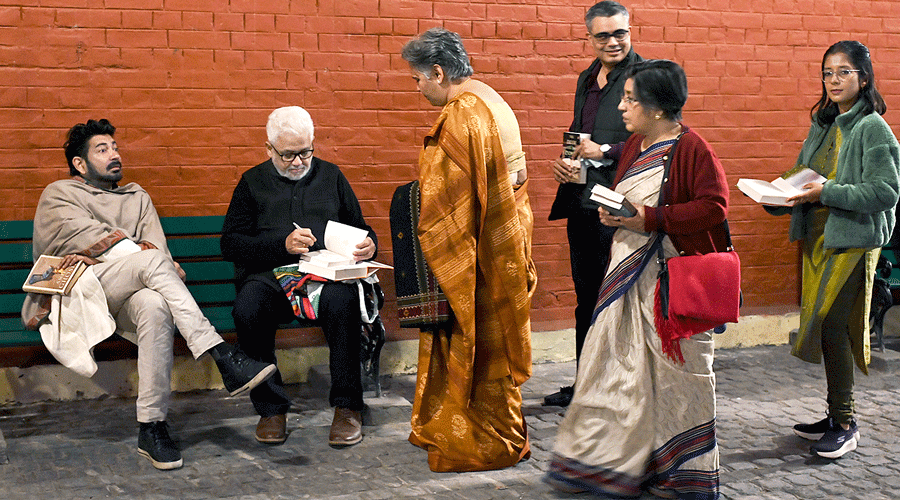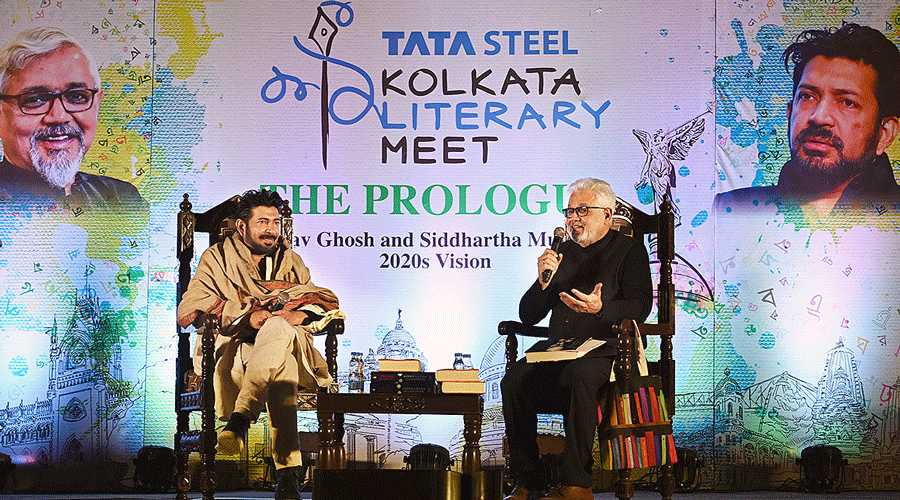Many commonalities bind two much-adored and award-winning authors.
A shared interest in history and science and exploring the idea of calamity are some of them. In the words of one, both of their books are “killer books”, in the literal sense. Throw them at someone and you might kill them.
But perhaps the most significant similarity is that their books can’t be straight-jacketed as books of history or science or as memoir or about the future. They are like “divine chochchoris (mish-mash)”.
A conversation on Friday between Amitav Ghosh and Siddhartha Mukherjee, billed as a prologue to the 11th edition of the Tata Steel Kolkata Literary Meet (Kalam), held in association with The Telegraph, lived up to every bit of the expectation around it. The literary meet starts at the Victoria Memorial on January 21.
While Ghosh is a “festival favourite”, Mukherjee — assistant professor of medicine at Columbia University, a cancer physician and researcher and the author of The Emperor of All Maladies: A Biography of Cancer, winner of the 2011 Pulitzer Prize in general non-fiction — made his debut appearance at Kolkata’s annual date with books and ideas.
Friday also marked the Indian launch of Mukherjee’s new book, The Song of the Cell.
The venue was the historic Alipore Jail, which has now been turned into a museum.
More than once, Mukherjee talked of “learning a lot” from Ghosh. But on Friday, it was Ghosh who asked most of the questions.
Excerpts from the conversation
Lingering suspicions Mukherjee has written on how, contrary to popular notion, vaccines did not originate in the West. They did in China, before travelling to India and the Arab world and then to the West.
Bringing that up, Ghosh said he thought some of the “lingering suspicions” over vaccinations and the anti-vaccine attitudes were linked to “xenophobia”.
The anti-vaccination campaign gained a lot of steam at the peak of the pandemic. From religious to purportedly scientific, vaccine sceptics cited several reasons and used social media to propagate their views.
The anti-vaccine movements came from different strands in different places, said Mukherjee.
The anti-vaccine movement in the US came from a libertarian strand, by people who believe that the body cannot be violated.
Outside the US, it was driven by a “suspicion of western medicine,” he said.

Visitors queue up to get books signed by Amitav Ghosh and Siddhartha Mukherjee after the “prologue” to the 11th edition of the Tata Steel Kolkata Literary Meet on Friday evening. Pradip Sanyal
“To some extent, western medicine, which I practise and believe in, has driven itself to the ground. By becoming a client of the pharma industry,” he added.
“There is a reinvention of history that is going on, a selective recall. These anti-vaccine supporters go back in time and they find moments in history when vaccination went wrong. There are several. Like all medicines, it has had a chequered past, with great successes and some failures. So, there are all these strands. There is a xenophobic strand, a libertarian strand and there is an anti-medicine strand. They converge, using the devices of selective reading and understanding of history to arrive at certain conclusions,” said Mukherjee.
Globalisation
Ghosh, the author of The Circle of Reason, The Shadow Lines, The Hungry Tide, The Ibis Trilogy and The Great Derangement: Climate Change and the Unthinkable, to name a few, said both he and Mukherjee had benefitted from globalisation.
From Mukherjee, he wanted to know about the “downside” of globalisation.
Mukherjee said the 20th-century vision of globalism was about export and import of the “right kinds of things”, like ideas, technologies and medicines.
“But the 21st-century vision has become very different. It is about the export of viruses, the forced export of migrants, the forced export of false science and false news and the import of these as well. I feel that the new globalism presents very acute challenges.... As we think of globalisation in the 21st century, although we have been beneficiaries, we have to think of it critically, as we think about everything in science, as having a flip side,” he said.
A system of knowledge
A “scepticism of expertise” surfaced in the Covid period, said Ghosh.
“We were told that Sweden, which followed a different path, would fail. That did not happen. Are they right, the naysayers?” he asked.
Mukherjee said inherent in the question were two “extraordinary” questions — what science is and what science does.
“Science, when done rightly, is a system to obtain knowledge. People think the emphasis should be on knowledge. But in fact, the emphasis should be on the system,” he said.
“The advantage of that system is that it has an in-built capacity, when it is working correctly, to self-correct. Its predictive value depends on the capacity to re-evaluate as new data enters the discourse. The forces of anti-science have rapidly exploited the idea that you get to knowledge directly, and that there is a shortcut. It obtains mysterious powers beyond itself and loses track of the system,” said Mukherjee.
